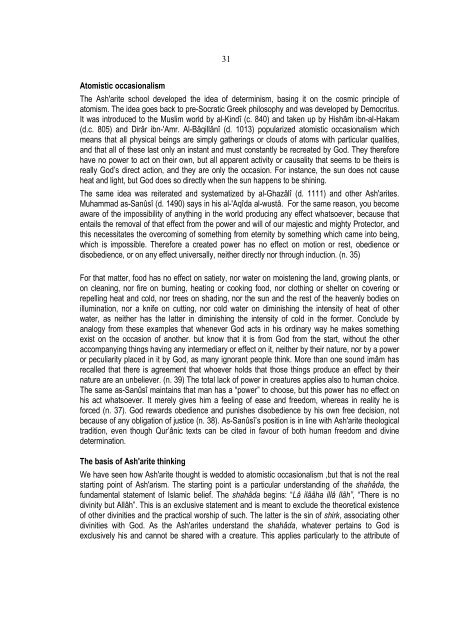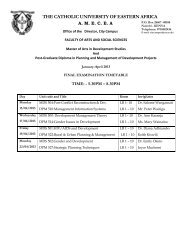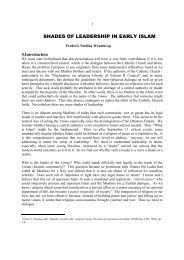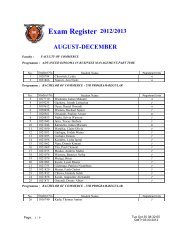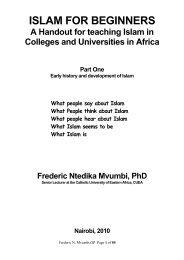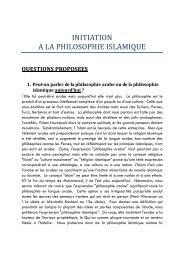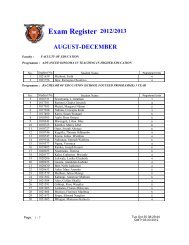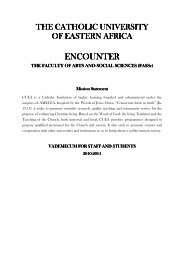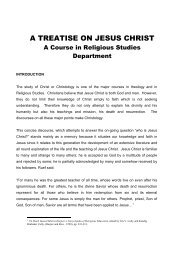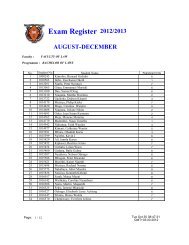INTRODUCTION TO ISLAMIC THEOLOGY.pdf - CUEA
INTRODUCTION TO ISLAMIC THEOLOGY.pdf - CUEA
INTRODUCTION TO ISLAMIC THEOLOGY.pdf - CUEA
You also want an ePaper? Increase the reach of your titles
YUMPU automatically turns print PDFs into web optimized ePapers that Google loves.
31Atomistic occasionalismThe Ash'arite school developed the idea of determinism, basing it on the cosmic principle ofatomism. The idea goes back to pre-Socratic Greek philosophy and was developed by Democritus.It was introduced to the Muslim world by al-Kindî (c. 840) and taken up by Hishâm ibn-al-Hakam(d.c. 805) and Dirâr ibn-'Amr. Al-Bâqillânî (d. 1013) popularized atomistic occasionalism whichmeans that all physical beings are simply gatherings or clouds of atoms with particular qualities,and that all of these last only an instant and must constantly be recreated by God. They thereforehave no power to act on their own, but all apparent activity or causality that seems to be theirs isreally God’s direct action, and they are only the occasion. For instance, the sun does not causeheat and light, but God does so directly when the sun happens to be shining.The same idea was reiterated and systematized by al-Ghazâlî (d. 1111) and other Ash'arites.Muhammad as-Sanûsî (d. 1490) says in his al-'Aqîda al-wustâ. For the same reason, you becomeaware of the impossibility of anything in the world producing any effect whatsoever, because thatentails the removal of that effect from the power and will of our majestic and mighty Protector, andthis necessitates the overcoming of something from eternity by something which came into being,which is impossible. Therefore a created power has no effect on motion or rest, obedience ordisobedience, or on any effect universally, neither directly nor through induction. (n. 35)For that matter, food has no effect on satiety, nor water on moistening the land, growing plants, oron cleaning, nor fire on burning, heating or cooking food, nor clothing or shelter on covering orrepelling heat and cold, nor trees on shading, nor the sun and the rest of the heavenly bodies onillumination, nor a knife on cutting, nor cold water on diminishing the intensity of heat of otherwater, as neither has the latter in diminishing the intensity of cold in the former. Conclude byanalogy from these examples that whenever God acts in his ordinary way he makes somethingexist on the occasion of another. but know that it is from God from the start, without the otheraccompanying things having any intermediary or effect on it, neither by their nature, nor by a poweror peculiarity placed in it by God, as many ignorant people think. More than one sound imâm hasrecalled that there is agreement that whoever holds that those things produce an effect by theirnature are an unbeliever. (n. 39) The total lack of power in creatures applies also to human choice.The same as-Sanûsî maintains that man has a “power” to choose, but this power has no effect onhis act whatsoever. It merely gives him a feeling of ease and freedom, whereas in reality he isforced (n. 37). God rewards obedience and punishes disobedience by his own free decision, notbecause of any obligation of justice (n. 38). As-Sanûsî’s position is in line with Ash'arite theologicaltradition, even though Qur’ânic texts can be cited in favour of both human freedom and divinedetermination.The basis of Ash'arite thinkingWe have seen how Ash'arite thought is wedded to atomistic occasionalism ,but that is not the realstarting point of Ash'arism. The starting point is a particular understanding of the shahâda, thefundamental statement of Islamic belief. The shahâda begins: “Lâ ilââha illâ llâh”, “There is nodivinity but Allâh”. This is an exclusive statement and is meant to exclude the theoretical existenceof other divinities and the practical worship of such. The latter is the sin of shirk, associating otherdivinities with God. As the Ash'arites understand the shahâda, whatever pertains to God isexclusively his and cannot be shared with a creature. This applies particularly to the attribute of


